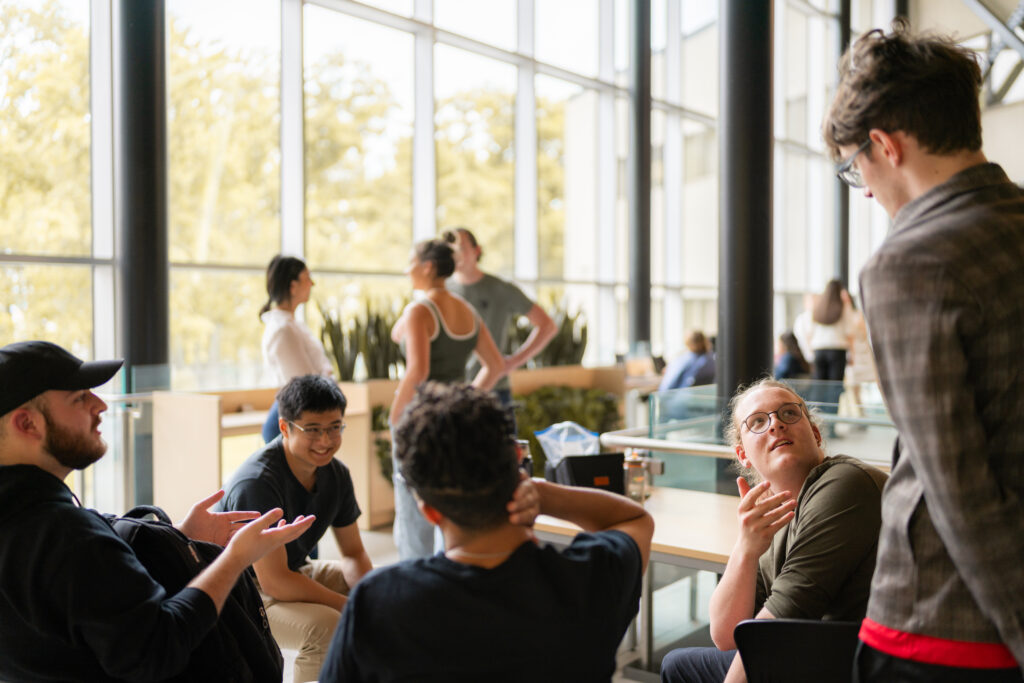300.16 - Double DECs
Double DEC Social Science + ALC
The Double DEC in Social Science and Arts, Literature & Communication (ALC) allows students to acquire a strong foundation in social sciences and languages.
Admission
- Fall
Duration
- 3 years
Interests
- Social Science
- Arts & Literature
- Languages
- Communications
- Business & Commerce
- Culture
- Health, Wellness & the Body
Requirements
- College general admission requirements
- For the Commerce or Mathematics profiles: Math TS 5 or SN 5
What You Can Expect from the Program
The Double DEC in Social Science and Arts, Literature and Communication (ALC) offers a dynamic, interdisciplinary learning experience that opens doors to a wider range of university programs and career opportunities than a single DEC. By combining the study of human behaviour, society, and global systems with literature, media, and culture, this program helps students develop strong analytical, critical thinking, and communication skills. For certain careers, like international studies, a broader foundation in both social sciences and the arts provides a stronger preparation for university studies than either the Social Science or ALC program alone.
The Double DEC program also features a reduced course load compared to a single DEC. This lighter allows students more time to focus on each course. Additionally, the extended timeline provides valuable opportunities for students to further discover their interests and improve their English-language skills before going to university.
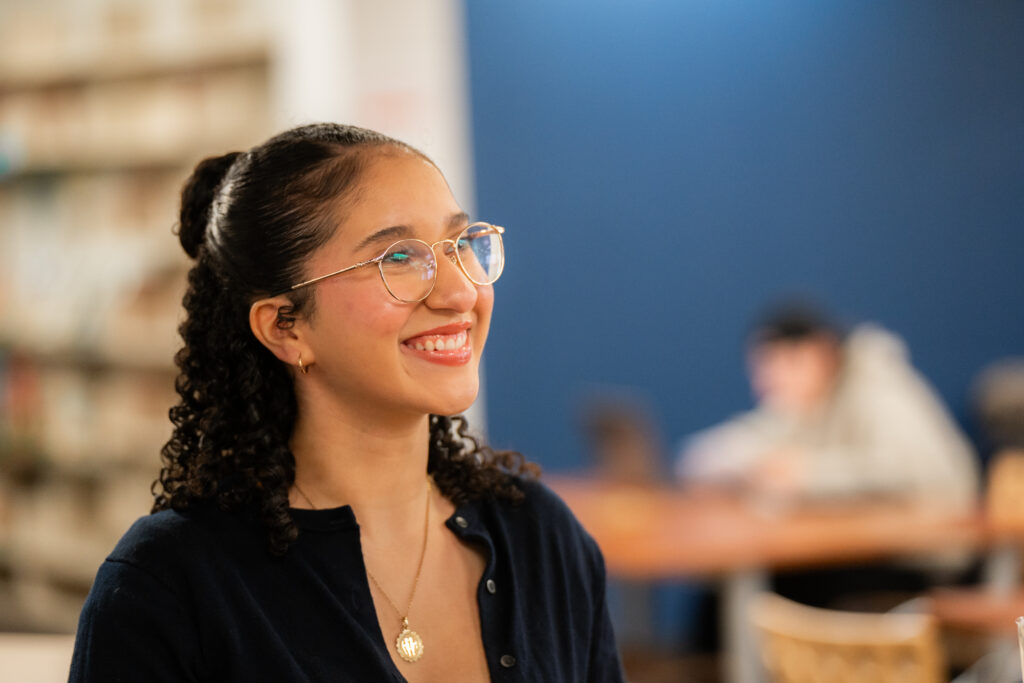
Study People, Languages, and the World Around You
Connecting Disciplines, Expanding Perspectives
Make meaningful connections between your social science and art courses. This interdisciplinary approach strengthens your ability to think critically, analyze issues from multiple perspectives, and communicate effectively. By combining the study of human behaviour, society, literature, and media, you develop a well-rounded skill set that prepares you for a wide range of university programs and careers.
A Program Shaped by Your Personal Interests
Choose the classes that interest you from a diverse range of social science courses, including psychology, sociology, political science, history, economics, geography, and business.
Study in French, English, and Spanish
Develop the multilingual communication skills that will make you stand out in any field.
During your Double DEC, you will have the opportunity to learn Spanish in college-level courses I, II and III as well as refine your skills in French and English.
2
Diplomas in 3 years
7
Social science subjects to explore
3
Languages of study
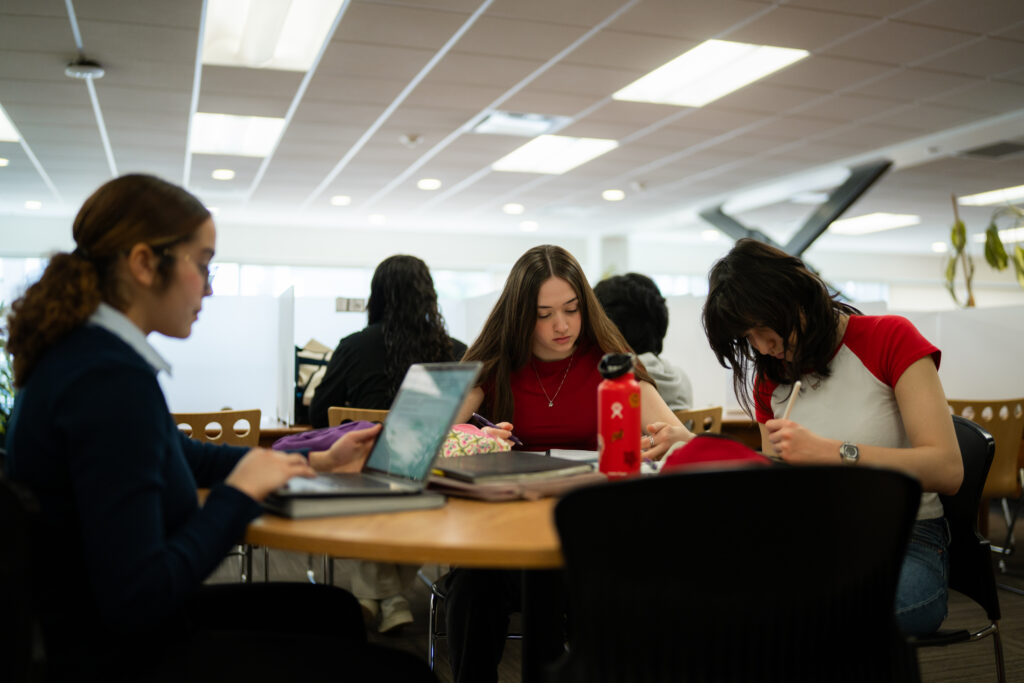
Take the Lead in Your Studies
While there are no formal profiles in the Double DEC program, you can personalize your upper-level course selections to align with your university and career goals. Within the Languages option, you’ll have the opportunity to study in English, French and Spanish. Your specific course sequence is determined by your Certificate status and your prior knowledge of Spanish.
If you are eligible to attend English school under the Charter of the French language and are in possession of a certificate granted by the Ministry of Education, you are considered a Certificate Holder. Your course sequence will then be determined by your results in the high school French course (1-2 or 3-4). For more information about Certificates, please consult the Ministry of Education’s website. If you are not eligible, you must follow the course sequence for Non Certificate Holders that prepares students for l’Épreuve uniforme de français (EUF – French ministerial language evaluation).
This sequence takes you through college-level courses I, II and III in Spanish.
This sequence takes you through college-level courses II, III and IV in Spanish.
Language Equivalency Procedure (Spanish)
Students with prior knowledge of Spanish may request a course equivalency for a fee of $25.
Steps:
- Submit the Request for Equivalency Form and $25 payment to admissionslc@crcmail.net. A placement test will be sent to you.
- Based on your results, you may be invited to complete an additional test during the Welcome Days.
- Once the College has your results, they will be transmitted to you, and you will be placed in the appropriate level. You will be given credit for the prior courses.
- If you have any questions, please contact the Academic Advisor.
Courses for Students Without Prior Spanish Knowledge
Your specific course sequence is determined by your Certificate status.
603-101-MQ
2-2-4
Introduction to College English
109-102-MQ
0-2-1
Physical Activity & Effectiveness
300-113-LW
1-2-2
Successful Academic Methods
This course will develop the Social Science student’s intellectual rigor, spirit of scientific inquiry and scientific literacy. It will introduce students to the necessary steps in the production of Social Science papers and oral presentations. Basic work habits will also be introduced.
330-114-LW
2-2-2
Introduction to Global History from the 15th Century to the Present
This course will explore the fundamental elements of world history in the early modern and modern eras as well as the key historical roots of these elements, leading to a better understanding of the current realities.
603-610-LW
2-2-4
Introduction to Creation
In this course, students will become familiar with the language used in the study of the arts, culture, and the creative process by exploring specific elements from various works of literature. They will learn to express their creativity by carrying out practical projects through which they will acquire a mastery of the tools and models used in the expression of one’s creativity.
602-110-LW
2-2-3
Le Québec à travers son art
Par l’application de différentes approches analytiques et l’étude de genres et de modes artistiques variés, les étudiant.e.s s’intéresseront à l’histoire du Québec et s’interrogeront sur l’évolution de la société au Québec au gré des époques et des différents milieux de vie. Au fil de leurs analyses, les étudiant.e.s pourront affiner leur regard sur le passé artistique et les développements actuels.
602-UF0-MQ
2-1-3
Oeuvres narratives et écriture
Total 24h / week
603-103-MQ
2-2-3
Literary Themes in Poetry
345-101-MQ
3-1-3
Knowledge
383-113-LW
3-0-3
Introduction to Macroeconomics
This course will allow a better understanding of the resource allocations in society.
602-120-LW
1-2-3
On sort: parcours culturels
Ce cours vise à offrir aux étudiant.e.s des occasions de découvertes artistiques dans un cadre analytique défini pour leur permettre de porter un jugement critique pertinent et personnel. Que ce soit par des visites au théâtre, par l’écoute de concerts, par la visite d’un musée ou par la participation à des événements multidisciplinaires, les étudiant.e.s seront invité.e.s à comprendre l’écosystème des différents milieux artistiques de la ville de Québec.
602-UF1-MQ
2-1-3
Poésie, théâtre et écriture
1st Level
2-1-3
First level option
1st Level
2-1-3
First level option
Total 23h / week
603-102-MQ
2-2-3
Literary Genres
345-102-MQ
3-0-3
World Views
300-214-LW
2-2-2
Qualitative Methods in the Social Science
This course will allow students to experiment with qualitative research methods in Social Science.
350-123-LW
2-1-3
Introduction à la psychologie
603-710-LW
2-2-3
Modes of Expression
By the end of this course, students will become familiar with the language and techniques specific to various modes of artistic and literary expression. In so doing, students will develop a thorough grasp of the methods of analysis and documentation pertaining to multiple forms of artistic expression.
603-610-LW
2-1-3
Spanish I
During and upon completion of this course students will be able to understand simple oral and written messages in Spanish and communicate orally and in writing in a number of basic everyday situations. They will be introduced to the culture and history of Spanish-speaking countries.
1st Level
2-1-3
First level option
Total 24h / week
603-BNR-LW
2-2-2
Long Fiction
109-101-MQ
1-1-1
Physical Activity and Health
603-810-LW
2-2-3
Evolving Expressions
The objective of this course is to take students on a historical journey and trace the evolution of a specific mode of expression in time and the artistic currents that have punctuated its development. Students will then apply the knowledge acquired in the course to the production of a creative project.
603-610-LW
2-1-3
Spanish II
During and upon completion of this course students will be able to understand more complex oral and written messages in Spanish compared to Spanish 1. They will also communicate orally and in writing in an additional number of basic everyday situations and demonstrate familiarity with fundamental aspects of the culture and history of Spanish-speaking countries.
602-UF2-MQ
2-1-3
Comparaison d’oeuvres littéraires
Enrichment
2-1-3
Enrichment course
Enrichment
2-1-3
Enrichment course
Total 22h / week
109-103-MQ
1-1-1
Physical Activity & Autonomy
360-214-LW
2-2-2
Quantitative Analysis in the Social Sciences
603-210-LW
2-1-3
Canadian Arts and Literature
This course is an exploration of Canadian cultural expression through the study of Canadian literature and associated arts. Students will explore and examine the relationship between works of Canadian fiction, cultural institutions and the creative process.
603-310-LW
2-2-3
Perspectives in English Literature
Students will learn to identify and apply different critical perspectives to works of literature and discover how such theories lead to contrasting views of the human condition.
607-310-LW
2-1-3
Spanish III
During and upon completion of this course, students will learn the structures and vocabulary needed to understand and communicate orally and in writing with some circumlocutions on most subjects relevant to everyday life. They will also interact spontaneously and meaningfully in Spanish to talk and discuss on topics related to the history and culture of Spanish-Speaking countries.
Enrichment
2-1-3
Enrichment course
Enrichment
2-1-3
Enrichment course
Total 22h / week
345-BNR-LW
3-0-3
Ethics
502-411-LW
2-2-4
Exploring Cultural Diversity
This course will enable students to compare aspects of contemporary culture between the local Canadian and Québec context and the context of countries associated with one of the foreign languages studied in the program (Spanish). Themes and issues will be approached in Spanish with the help of examples from the arts, short literary texts and coverage in the media.
603-550-LW
2-2-4
Pop Fiction
In a variety of works and genres, students will explore the fascinating world of Pop Fiction, the themes and media used for its expression, and the meaning and purpose of Pop Fiction in the postmodern age.
300-313-LW
1-2-3
Integrative Activity (Social)
602-130-LW
2-2-4
Projet créatif
Dans le cadre de ce cours, les étudiant.e.s seront initié.e.s à différentes approches créatives, en littérature, en poésie, en théâtre, etc., en vue de la création d’un projet personnel, de son élaboration à la production finale. Afin de bien s’inscrire dans leur milieu culturel, les étudiant.e.s devront s’appuyer sur leurs connaissances pour justifier les choix artistiques qu’ils et elles auront voulu mettre en œuvre.
Enrichment
2-1-3
Enrichment course
Enrichment
2-1-3
Enrichment course
Total 24h / week
603-101-MQ
2-2-4
Introduction to College English
109-102-MQ
0-2-1
Physical Activity & Effectiveness
300-113-LW
1-2-2
Successful Academic Methods
This course will develop the Social Science student’s intellectual rigor, spirit of scientific inquiry and scientific literacy. It will introduce students to the necessary steps in the production of Social Science papers and oral presentations. Basic work habits will also be introduced.
330-114-LW
2-2-2
Introduction to Global History from the 15th Century to the Present
This course will explore the fundamental elements of world history in the early modern and modern eras as well as the key historical roots of these elements, leading to a better understanding of the current realities.
603-610-LW
2-2-4
Introduction to Creation
In this course, students will become familiar with the language used in the study of the arts, culture, and the creative process by exploring specific elements from various works of literature. They will learn to express their creativity by carrying out practical projects through which they will acquire a mastery of the tools and models used in the expression of one’s creativity.
602-110-LW
2-2-3
Le Québec à travers son art
Par l’application de différentes approches analytiques et l’étude de genres et de modes artistiques variés, les étudiant.e.s s’intéresseront à l’histoire du Québec et s’interrogeront sur l’évolution de la société au Québec au gré des époques et des différents milieux de vie. Au fil de leurs analyses, les étudiant.e.s pourront affiner leur regard sur le passé artistique et les développements actuels.
602-10X-MQ
2-1-3
Français Bloc A
Total 24h / week
603-103-MQ
2-2-3
Literary Themes in Poetry
345-101-MQ
3-1-3
Knowledge
383-113-LW
3-0-3
Introduction to Macroeconomics
This course will allow a better understanding of the resource allocations in society.
602-120-LW
1-2-3
On sort: parcours culturels
Ce cours vise à offrir aux étudiant.e.s des occasions de découvertes artistiques dans un cadre analytique défini pour leur permettre de porter un jugement critique pertinent et personnel. Que ce soit par des visites au théâtre, par l’écoute de concerts, par la visite d’un musée ou par la participation à des événements multidisciplinaires, les étudiant.e.s seront invité.e.s à comprendre l’écosystème des différents milieux artistiques de la ville de Québec.
602-BNY-MQ
2-1-3
Français Bloc B
1st Level
2-1-3
First level option
1st Level
2-1-3
First level option
1st Level
2-1-3
First level option
Total 26h / week
603-102-MQ
2-2-3
Literary Genres
345-102-MQ
3-0-3
World Views
300-214-LW
2-2-2
Qualitative Methods in the Social Science
This course will allow students to experiment with qualitative research methods in Social Science.
350-113-LW
2-1-3
Introduction to Psychology
This course is an overview of scientific methodology in the study of human behavior. It examines and studies the scientific bases of behaviour to increase the awareness and understanding of the factors which interact to explain human emotional, cognitive, and behavioural processes and experiences.
603-710-LW
2-2-3
Modes of Expression
By the end of this course, students will become familiar with the language and techniques specific to various modes of artistic and literary expression. In so doing, students will develop a thorough grasp of the methods of analysis and documentation pertaining to multiple forms of artistic expression.
603-610-LW
2-1-3
Spanish I
During and upon completion of this course students will be able to understand simple oral and written messages in Spanish and communicate orally and in writing in a number of basic everyday situations. They will be introduced to the culture and history of Spanish-speaking countries.
1st Level
2-1-3
First level option
Total 24h / week
603-BNR-LW
2-2-2
Long Fiction
109-101-MQ
1-1-1
Physical Activity and Health
603-810-LW
2-2-3
Evolving Expressions
The objective of this course is to take students on a historical journey and trace the evolution of a specific mode of expression in time and the artistic currents that have punctuated its development. Students will then apply the knowledge acquired in the course to the production of a creative project.
603-610-LW
2-1-3
Spanish II
During and upon completion of this course students will be able to understand more complex oral and written messages in Spanish compared to Spanish 1. They will also communicate orally and in writing in an additional number of basic everyday situations and demonstrate familiarity with fundamental aspects of the culture and history of Spanish-speaking countries.
Enrichment
2-1-3
Enrichment course
Enrichment
2-1-3
Enrichment course
Enrichment
2-1-3
Enrichment course
Total 22h / week
109-103-MQ
1-1-1
Physical Activity & Autonomy
360-214-LW
2-2-2
Quantitative Analysis in the Social Sciences
603-210-LW
2-1-3
Canadian Arts and Literature
This course is an exploration of Canadian cultural expression through the study of Canadian literature and associated arts. Students will explore and examine the relationship between works of Canadian fiction, cultural institutions and the creative process.
603-310-LW
2-2-3
Perspectives in English Literature
Students will learn to identify and apply different critical perspectives to works of literature and discover how such theories lead to contrasting views of the human condition.
607-310-LW
2-1-3
Spanish III
During and upon completion of this course, students will learn the structures and vocabulary needed to understand and communicate orally and in writing with some circumlocutions on most subjects relevant to everyday life. They will also interact spontaneously and meaningfully in Spanish to talk and discuss on topics related to the history and culture of Spanish-Speaking countries.
Enrichment
2-1-3
Enrichment course
Enrichment
2-1-3
Enrichment course
Total 22h / week
345-BNR-LW
3-0-3
Ethics
502-411-LW
2-2-4
Exploring Cultural Diversity
This course will enable students to compare aspects of contemporary culture between the local Canadian and Québec context and the context of countries associated with one of the foreign languages studied in the program (Spanish). Themes and issues will be approached in Spanish with the help of examples from the arts, short literary texts and coverage in the media.
603-550-LW
2-2-4
Pop Fiction
In a variety of works and genres, students will explore the fascinating world of Pop Fiction, the themes and media used for its expression, and the meaning and purpose of Pop Fiction in the postmodern age.
300-313-LW
1-2-3
Integrative Activity (Social)
602-130-LW
2-2-4
Projet créatif
Dans le cadre de ce cours, les étudiant.e.s seront initié.e.s à différentes approches créatives, en littérature, en poésie, en théâtre, etc., en vue de la création d’un projet personnel, de son élaboration à la production finale. Afin de bien s’inscrire dans leur milieu culturel, les étudiant.e.s devront s’appuyer sur leurs connaissances pour justifier les choix artistiques qu’ils et elles auront voulu mettre en œuvre.
Enrichment
2-1-3
Enrichment course
Total 21h / week
603-101-MQ
2-2-4
Introduction to College English
109-102-MQ
0-2-1
Physical Activity & Effectiveness
300-113-LW
1-2-2
Successful Academic Methods
This course will develop the Social Science student’s intellectual rigor, spirit of scientific inquiry and scientific literacy. It will introduce students to the necessary steps in the production of Social Science papers and oral presentations. Basic work habits will also be introduced.
330-114-LW
2-2-2
Introduction to Global History from the 15th Century to the Present
This course will explore the fundamental elements of world history in the early modern and modern eras as well as the key historical roots of these elements, leading to a better understanding of the current realities.
603-610-LW
2-2-4
Introduction to Creation
In this course, students will become familiar with the language used in the study of the arts, culture, and the creative process by exploring specific elements from various works of literature. They will learn to express their creativity by carrying out practical projects through which they will acquire a mastery of the tools and models used in the expression of one’s creativity.
602-110-LW
2-2-3
Le Québec à travers son art
Par l’application de différentes approches analytiques et l’étude de genres et de modes artistiques variés, les étudiant.e.s s’intéresseront à l’histoire du Québec et s’interrogeront sur l’évolution de la société au Québec au gré des époques et des différents milieux de vie. Au fil de leurs analyses, les étudiant.e.s pourront affiner leur regard sur le passé artistique et les développements actuels.
602-10X-MQ
2-1-3
Français Bloc A
Total 24h / week
603-103-MQ
2-2-3
Literary Themes in Poetry
345-101-MQ
3-1-3
Knowledge
383-113-LW
3-0-3
Introduction to Macroeconomics
This course will allow a better understanding of the resource allocations in society.
602-120-LW
1-2-3
On sort: parcours culturels
Ce cours vise à offrir aux étudiant.e.s des occasions de découvertes artistiques dans un cadre analytique défini pour leur permettre de porter un jugement critique pertinent et personnel. Que ce soit par des visites au théâtre, par l’écoute de concerts, par la visite d’un musée ou par la participation à des événements multidisciplinaires, les étudiant.e.s seront invité.e.s à comprendre l’écosystème des différents milieux artistiques de la ville de Québec.
1st Level
2-1-3
First level option
1st Level
2-1-3
First level option
1st Level
2-1-3
First level option
1st Level
2-1-3
First level option
Total 26h / week
603-102-MQ
2-2-3
Literary Genres
345-112-MQ
3-0-3
Conceptions du monde
300-214-LW
2-2-2
Qualitative Methods in the Social Science
This course will allow students to experiment with qualitative research methods in Social Science.
350-123-LW
2-1-3
Introduction à la psychologie
603-710-LW
2-2-3
Modes of Expression
By the end of this course, students will become familiar with the language and techniques specific to various modes of artistic and literary expression. In so doing, students will develop a thorough grasp of the methods of analysis and documentation pertaining to multiple forms of artistic expression.
603-610-LW
2-1-3
Spanish I
During and upon completion of this course students will be able to understand simple oral and written messages in Spanish and communicate orally and in writing in a number of basic everyday situations. They will be introduced to the culture and history of Spanish-speaking countries.
Enrichment
2-1-3
Enrichment course
Total 24h / week
603-BNR-LW
2-2-2
Long Fiction
109-101-MQ
1-1-1
Physical Activity and Health
603-810-LW
2-2-3
Evolving Expressions
The objective of this course is to take students on a historical journey and trace the evolution of a specific mode of expression in time and the artistic currents that have punctuated its development. Students will then apply the knowledge acquired in the course to the production of a creative project.
603-610-LW
2-1-3
Spanish II
During and upon completion of this course students will be able to understand more complex oral and written messages in Spanish compared to Spanish 1. They will also communicate orally and in writing in an additional number of basic everyday situations and demonstrate familiarity with fundamental aspects of the culture and history of Spanish-speaking countries.
602-BNY-MQ
2-1-3
Français Bloc B
Enrichment
2-1-3
Enrichment course
Enrichment
2-1-3
Enrichment course
Total 22h / week
109-103-MQ
1-1-1
Physical Activity & Autonomy
360-214-LW
2-2-2
Quantitative Analysis in the Social Sciences
603-210-LW
2-1-3
Canadian Arts and Literature
This course is an exploration of Canadian cultural expression through the study of Canadian literature and associated arts. Students will explore and examine the relationship between works of Canadian fiction, cultural institutions and the creative process.
603-310-LW
2-2-3
Perspectives in English Literature
Students will learn to identify and apply different critical perspectives to works of literature and discover how such theories lead to contrasting views of the human condition.
607-310-LW
2-1-3
Spanish III
During and upon completion of this course, students will learn the structures and vocabulary needed to understand and communicate orally and in writing with some circumlocutions on most subjects relevant to everyday life. They will also interact spontaneously and meaningfully in Spanish to talk and discuss on topics related to the history and culture of Spanish-Speaking countries.
Enrichment
2-1-3
Enrichment course
Enrichment
2-1-3
Enrichment course
Total 22h / week
345-BNR-LW
3-0-3
Ethics
502-411-LW
2-2-4
Exploring Cultural Diversity
This course will enable students to compare aspects of contemporary culture between the local Canadian and Québec context and the context of countries associated with one of the foreign languages studied in the program (Spanish). Themes and issues will be approached in Spanish with the help of examples from the arts, short literary texts and coverage in the media.
603-550-LW
2-2-4
Pop Fiction
In a variety of works and genres, students will explore the fascinating world of Pop Fiction, the themes and media used for its expression, and the meaning and purpose of Pop Fiction in the postmodern age.
300-313-LW
1-2-3
Integrative Activity (Social)
602-130-LW
2-2-4
Projet créatif
Dans le cadre de ce cours, les étudiant.e.s seront initié.e.s à différentes approches créatives, en littérature, en poésie, en théâtre, etc., en vue de la création d’un projet personnel, de son élaboration à la production finale. Afin de bien s’inscrire dans leur milieu culturel, les étudiant.e.s devront s’appuyer sur leurs connaissances pour justifier les choix artistiques qu’ils et elles auront voulu mettre en œuvre.
Enrichment
2-1-3
Enrichment course
Total 21h / week
Courses for Students With Prior Spanish Knowledge
Your specific course sequence is determined by your Certificate status.
603-101-MQ
2-2-4
Introduction to College English
109-102-MQ
0-2-1
Physical Activity & Effectiveness
300-113-LW
1-2-2
Successful Academic Methods
This course will develop the Social Science student’s intellectual rigor, spirit of scientific inquiry and scientific literacy. It will introduce students to the necessary steps in the production of Social Science papers and oral presentations. Basic work habits will also be introduced.
350-123-LW
2-1-3
Introduction à la psychologie
603-610-LW
2-2-4
Introduction to Creation
In this course, students will become familiar with the language used in the study of the arts, culture, and the creative process by exploring specific elements from various works of literature. They will learn to express their creativity by carrying out practical projects through which they will acquire a mastery of the tools and models used in the expression of one’s creativity.
602-110-LW
2-2-3
Le Québec à travers son art
Par l’application de différentes approches analytiques et l’étude de genres et de modes artistiques variés, les étudiant.e.s s’intéresseront à l’histoire du Québec et s’interrogeront sur l’évolution de la société au Québec au gré des époques et des différents milieux de vie. Au fil de leurs analyses, les étudiant.e.s pourront affiner leur regard sur le passé artistique et les développements actuels.
602-UF0-MQ
2-1-3
Oeuvres narratives et écriture
Total 23h / week
603-103-MQ
2-2-3
Literary Themes in Poetry
109-101-MQ
1-1-1
Physical Activity and Health
330-114-LW
2-2-2
Introduction to Global History from the 15th Century to the Present
This course will explore the fundamental elements of world history in the early modern and modern eras as well as the key historical roots of these elements, leading to a better understanding of the current realities.
603-610-LW
2-1-3
Spanish II
During and upon completion of this course students will be able to understand more complex oral and written messages in Spanish compared to Spanish 1. They will also communicate orally and in writing in an additional number of basic everyday situations and demonstrate familiarity with fundamental aspects of the culture and history of Spanish-speaking countries.
602-UF1-MQ
2-1-3
Poésie, théâtre et écriture
1st Level
2-1-3
First level option
1st Level
2-1-3
First level option
Total 22h / week
603-102-MQ
2-2-3
Literary Genres
345-101-MQ
3-1-3
Knowledge
383-113-LW
3-0-3
Introduction to Macroeconomics
This course will allow a better understanding of the resource allocations in society.
603-710-LW
2-2-3
Modes of Expression
By the end of this course, students will become familiar with the language and techniques specific to various modes of artistic and literary expression. In so doing, students will develop a thorough grasp of the methods of analysis and documentation pertaining to multiple forms of artistic expression.
607-310-LW
2-1-3
Spanish III
During and upon completion of this course, students will learn the structures and vocabulary needed to understand and communicate orally and in writing with some circumlocutions on most subjects relevant to everyday life. They will also interact spontaneously and meaningfully in Spanish to talk and discuss on topics related to the history and culture of Spanish-Speaking countries.
300-214-LW
2-2-2
Qualitative Methods in the Social Science
This course will allow students to experiment with qualitative research methods in Social Science.
1st Level
2-1-3
First level option
Total 25h / week
603-BNR-LW
2-2-2
Long Fiction
345-102-MQ
3-0-3
World Views
360-214-LW
2-2-2
Quantitative Analysis in the Social Sciences
603-810-LW
2-2-3
Evolving Expressions
The objective of this course is to take students on a historical journey and trace the evolution of a specific mode of expression in time and the artistic currents that have punctuated its development. Students will then apply the knowledge acquired in the course to the production of a creative project.
607-410-LW
2-1-3
Spanish IV
During and upon completion of this course students will be able to understand more complex oral and written messages in Spanish and communicate orally and in writing in an additional number of basic everyday situations compared to Spanish III. They will demonstrate familiarity with additional aspects of the culture and history of Spanish-speaking countries. They will interact spontaneously and meaningfully in Spanish.
602-120-LW
1-2-3
On sort: parcours culturels
Ce cours vise à offrir aux étudiant.e.s des occasions de découvertes artistiques dans un cadre analytique défini pour leur permettre de porter un jugement critique pertinent et personnel. Que ce soit par des visites au théâtre, par l’écoute de concerts, par la visite d’un musée ou par la participation à des événements multidisciplinaires, les étudiant.e.s seront invité.e.s à comprendre l’écosystème des différents milieux artistiques de la ville de Québec.
Enrichment
2-1-3
Enrichment course
Total 24h / week
345-BNR-LW
3-0-3
Ethics
603-210-LW
2-1-3
Canadian Arts and Literature
This course is an exploration of Canadian cultural expression through the study of Canadian literature and associated arts. Students will explore and examine the relationship between works of Canadian fiction, cultural institutions and the creative process.
603-310-LW
2-2-3
Perspectives in English Literature
Students will learn to identify and apply different critical perspectives to works of literature and discover how such theories lead to contrasting views of the human condition.
602-UF2-MQ
2-1-3
Comparaison d’oeuvres littéraires
Enrichment
2-1-3
Enrichment course
Enrichment
2-1-3
Enrichment course
Enrichment
2-1-3
Enrichment course
Total 22h / week
109-103-MQ
1-1-1
Physical Activity & Autonomy
502-411-LW
2-2-4
Exploring Cultural Diversity
This course will enable students to compare aspects of contemporary culture between the local Canadian and Québec context and the context of countries associated with one of the foreign languages studied in the program (Spanish). Themes and issues will be approached in Spanish with the help of examples from the arts, short literary texts and coverage in the media.
603-550-LW
2-2-4
Pop Fiction
In a variety of works and genres, students will explore the fascinating world of Pop Fiction, the themes and media used for its expression, and the meaning and purpose of Pop Fiction in the postmodern age.
300-313-LW
1-2-3
Integrative Activity (Social)
602-130-LW
2-2-4
Projet créatif
Dans le cadre de ce cours, les étudiant.e.s seront initié.e.s à différentes approches créatives, en littérature, en poésie, en théâtre, etc., en vue de la création d’un projet personnel, de son élaboration à la production finale. Afin de bien s’inscrire dans leur milieu culturel, les étudiant.e.s devront s’appuyer sur leurs connaissances pour justifier les choix artistiques qu’ils et elles auront voulu mettre en œuvre.
Enrichment
2-1-3
Enrichment course
Enrichment
2-1-3
Enrichment course
Total 23h / week
603-101-MQ
2-2-4
Introduction to College English
109-102-MQ
0-2-1
Physical Activity & Effectiveness
300-113-LW
1-2-2
Successful Academic Methods
This course will develop the Social Science student’s intellectual rigor, spirit of scientific inquiry and scientific literacy. It will introduce students to the necessary steps in the production of Social Science papers and oral presentations. Basic work habits will also be introduced.
350-113-LW
2-1-3
Introduction to Psychology
This course is an overview of scientific methodology in the study of human behavior. It examines and studies the scientific bases of behaviour to increase the awareness and understanding of the factors which interact to explain human emotional, cognitive, and behavioural processes and experiences.
603-610-LW
2-2-4
Introduction to Creation
In this course, students will become familiar with the language used in the study of the arts, culture, and the creative process by exploring specific elements from various works of literature. They will learn to express their creativity by carrying out practical projects through which they will acquire a mastery of the tools and models used in the expression of one’s creativity.
602-110-LW
2-2-3
Le Québec à travers son art
Par l’application de différentes approches analytiques et l’étude de genres et de modes artistiques variés, les étudiant.e.s s’intéresseront à l’histoire du Québec et s’interrogeront sur l’évolution de la société au Québec au gré des époques et des différents milieux de vie. Au fil de leurs analyses, les étudiant.e.s pourront affiner leur regard sur le passé artistique et les développements actuels.
602-10X-MQ
2-1-3
Français Bloc A
Total 23h / week
603-103-MQ
2-2-3
Literary Themes in Poetry
109-101-MQ
1-1-1
Physical Activity and Health
330-114-LW
2-2-2
Introduction to Global History from the 15th Century to the Present
This course will explore the fundamental elements of world history in the early modern and modern eras as well as the key historical roots of these elements, leading to a better understanding of the current realities.
603-610-LW
2-1-3
Spanish II
During and upon completion of this course students will be able to understand more complex oral and written messages in Spanish compared to Spanish 1. They will also communicate orally and in writing in an additional number of basic everyday situations and demonstrate familiarity with fundamental aspects of the culture and history of Spanish-speaking countries.
602-BNY-MQ
2-1-3
Français Bloc B
1st Level
2-1-3
First level option
1st Level
2-1-3
First level option
Total 22h / week
603-102-MQ
2-2-3
Literary Genres
345-101-MQ
3-1-3
Knowledge
383-113-LW
3-0-3
Introduction to Macroeconomics
This course will allow a better understanding of the resource allocations in society.
603-710-LW
2-2-3
Modes of Expression
By the end of this course, students will become familiar with the language and techniques specific to various modes of artistic and literary expression. In so doing, students will develop a thorough grasp of the methods of analysis and documentation pertaining to multiple forms of artistic expression.
607-310-LW
2-1-3
Spanish III
During and upon completion of this course, students will learn the structures and vocabulary needed to understand and communicate orally and in writing with some circumlocutions on most subjects relevant to everyday life. They will also interact spontaneously and meaningfully in Spanish to talk and discuss on topics related to the history and culture of Spanish-Speaking countries.
1st Level
2-1-3
First level option
Total 21h / week
603-BNR-LW
2-2-2
Long Fiction
345-102-MQ
3-0-3
World Views
360-214-LW
2-2-2
Quantitative Analysis in the Social Sciences
603-810-LW
2-2-3
Evolving Expressions
The objective of this course is to take students on a historical journey and trace the evolution of a specific mode of expression in time and the artistic currents that have punctuated its development. Students will then apply the knowledge acquired in the course to the production of a creative project.
607-410-LW
2-1-3
Spanish IV
During and upon completion of this course students will be able to understand more complex oral and written messages in Spanish and communicate orally and in writing in an additional number of basic everyday situations compared to Spanish III. They will demonstrate familiarity with additional aspects of the culture and history of Spanish-speaking countries. They will interact spontaneously and meaningfully in Spanish.
602-120-LW
1-2-3
On sort: parcours culturels
Ce cours vise à offrir aux étudiant.e.s des occasions de découvertes artistiques dans un cadre analytique défini pour leur permettre de porter un jugement critique pertinent et personnel. Que ce soit par des visites au théâtre, par l’écoute de concerts, par la visite d’un musée ou par la participation à des événements multidisciplinaires, les étudiant.e.s seront invité.e.s à comprendre l’écosystème des différents milieux artistiques de la ville de Québec.
Enrichment
2-1-3
Enrichment course
Total 24h / week
345-BNR-LW
3-0-3
Ethics
603-210-LW
2-1-3
Canadian Arts and Literature
This course is an exploration of Canadian cultural expression through the study of Canadian literature and associated arts. Students will explore and examine the relationship between works of Canadian fiction, cultural institutions and the creative process.
603-310-LW
2-2-3
Perspectives in English Literature
Students will learn to identify and apply different critical perspectives to works of literature and discover how such theories lead to contrasting views of the human condition.
300-214-LW
2-2-2
Qualitative Methods in the Social Science
This course will allow students to experiment with qualitative research methods in Social Science.
Enrichment
2-1-3
Enrichment course
Enrichment
2-1-3
Enrichment course
Enrichment
2-1-3
Enrichment course
Total 23h / week
109-103-MQ
1-1-1
Physical Activity & Autonomy
502-411-LW
2-2-4
Exploring Cultural Diversity
This course will enable students to compare aspects of contemporary culture between the local Canadian and Québec context and the context of countries associated with one of the foreign languages studied in the program (Spanish). Themes and issues will be approached in Spanish with the help of examples from the arts, short literary texts and coverage in the media.
603-550-LW
2-2-4
Pop Fiction
In a variety of works and genres, students will explore the fascinating world of Pop Fiction, the themes and media used for its expression, and the meaning and purpose of Pop Fiction in the postmodern age.
300-313-LW
1-2-3
Integrative Activity (Social)
602-130-LW
2-2-4
Projet créatif
Dans le cadre de ce cours, les étudiant.e.s seront initié.e.s à différentes approches créatives, en littérature, en poésie, en théâtre, etc., en vue de la création d’un projet personnel, de son élaboration à la production finale. Afin de bien s’inscrire dans leur milieu culturel, les étudiant.e.s devront s’appuyer sur leurs connaissances pour justifier les choix artistiques qu’ils et elles auront voulu mettre en œuvre.
Enrichment
2-1-3
Enrichment course
Enrichment
2-1-3
Enrichment course
Total 23h / week
603-101-MQ
2-2-4
Introduction to College English
109-102-MQ
0-2-1
Physical Activity & Effectiveness
300-113-LW
1-2-2
Successful Academic Methods
This course will develop the Social Science student’s intellectual rigor, spirit of scientific inquiry and scientific literacy. It will introduce students to the necessary steps in the production of Social Science papers and oral presentations. Basic work habits will also be introduced.
350-123-LW
2-1-3
Introduction à la psychologie
603-610-LW
2-2-4
Introduction to Creation
In this course, students will become familiar with the language used in the study of the arts, culture, and the creative process by exploring specific elements from various works of literature. They will learn to express their creativity by carrying out practical projects through which they will acquire a mastery of the tools and models used in the expression of one’s creativity.
602-110-LW
2-2-3
Le Québec à travers son art
Par l’application de différentes approches analytiques et l’étude de genres et de modes artistiques variés, les étudiant.e.s s’intéresseront à l’histoire du Québec et s’interrogeront sur l’évolution de la société au Québec au gré des époques et des différents milieux de vie. Au fil de leurs analyses, les étudiant.e.s pourront affiner leur regard sur le passé artistique et les développements actuels.
602-10X-MQ
2-1-3
Français Bloc A
Total 23h / week
603-103-MQ
2-2-3
Literary Themes in Poetry
109-101-MQ
1-1-1
Physical Activity and Health
330-114-LW
2-2-2
Introduction to Global History from the 15th Century to the Present
This course will explore the fundamental elements of world history in the early modern and modern eras as well as the key historical roots of these elements, leading to a better understanding of the current realities.
603-610-LW
2-1-3
Spanish II
During and upon completion of this course students will be able to understand more complex oral and written messages in Spanish compared to Spanish 1. They will also communicate orally and in writing in an additional number of basic everyday situations and demonstrate familiarity with fundamental aspects of the culture and history of Spanish-speaking countries.
602-BNY-MQ
2-1-3
Français Bloc B
1st Level
2-1-3
First level option
1st Level
2-1-3
First level option
Total 22h / week
603-102-MQ
2-2-3
Literary Genres
345-101-MQ
3-1-3
Knowledge
383-113-LW
3-0-3
Introduction to Macroeconomics
This course will allow a better understanding of the resource allocations in society.
603-710-LW
2-2-3
Modes of Expression
By the end of this course, students will become familiar with the language and techniques specific to various modes of artistic and literary expression. In so doing, students will develop a thorough grasp of the methods of analysis and documentation pertaining to multiple forms of artistic expression.
607-310-LW
2-1-3
Spanish III
During and upon completion of this course, students will learn the structures and vocabulary needed to understand and communicate orally and in writing with some circumlocutions on most subjects relevant to everyday life. They will also interact spontaneously and meaningfully in Spanish to talk and discuss on topics related to the history and culture of Spanish-Speaking countries.
1st Level
2-1-3
First level option
Total 21h / week
603-BNR-LW
2-2-2
Long Fiction
345-112-MQ
3-0-3
Conceptions du monde
360-214-LW
2-2-2
Quantitative Analysis in the Social Sciences
603-810-LW
2-2-3
Evolving Expressions
The objective of this course is to take students on a historical journey and trace the evolution of a specific mode of expression in time and the artistic currents that have punctuated its development. Students will then apply the knowledge acquired in the course to the production of a creative project.
607-410-LW
2-1-3
Spanish IV
During and upon completion of this course students will be able to understand more complex oral and written messages in Spanish and communicate orally and in writing in an additional number of basic everyday situations compared to Spanish III. They will demonstrate familiarity with additional aspects of the culture and history of Spanish-speaking countries. They will interact spontaneously and meaningfully in Spanish.
602-120-LW
1-2-3
On sort: parcours culturels
Ce cours vise à offrir aux étudiant.e.s des occasions de découvertes artistiques dans un cadre analytique défini pour leur permettre de porter un jugement critique pertinent et personnel. Que ce soit par des visites au théâtre, par l’écoute de concerts, par la visite d’un musée ou par la participation à des événements multidisciplinaires, les étudiant.e.s seront invité.e.s à comprendre l’écosystème des différents milieux artistiques de la ville de Québec.
Enrichment
2-1-3
Enrichment course
Total 24h / week
345-BNR-LW
3-0-3
Ethics
603-210-LW
2-1-3
Canadian Arts and Literature
This course is an exploration of Canadian cultural expression through the study of Canadian literature and associated arts. Students will explore and examine the relationship between works of Canadian fiction, cultural institutions and the creative process.
603-310-LW
2-2-3
Perspectives in English Literature
Students will learn to identify and apply different critical perspectives to works of literature and discover how such theories lead to contrasting views of the human condition.
300-214-LW
2-2-2
Qualitative Methods in the Social Science
This course will allow students to experiment with qualitative research methods in Social Science.
Enrichment
2-1-3
Enrichment course
Enrichment
2-1-3
Enrichment course
Enrichment
2-1-3
Enrichment course
Total 23h / week
109-103-MQ
1-1-1
Physical Activity & Autonomy
502-411-LW
2-2-4
Exploring Cultural Diversity
This course will enable students to compare aspects of contemporary culture between the local Canadian and Québec context and the context of countries associated with one of the foreign languages studied in the program (Spanish). Themes and issues will be approached in Spanish with the help of examples from the arts, short literary texts and coverage in the media.
603-550-LW
2-2-4
Pop Fiction
In a variety of works and genres, students will explore the fascinating world of Pop Fiction, the themes and media used for its expression, and the meaning and purpose of Pop Fiction in the postmodern age.
300-313-LW
1-2-3
Integrative Activity (Social)
602-130-LW
2-2-4
Projet créatif
Dans le cadre de ce cours, les étudiant.e.s seront initié.e.s à différentes approches créatives, en littérature, en poésie, en théâtre, etc., en vue de la création d’un projet personnel, de son élaboration à la production finale. Afin de bien s’inscrire dans leur milieu culturel, les étudiant.e.s devront s’appuyer sur leurs connaissances pour justifier les choix artistiques qu’ils et elles auront voulu mettre en œuvre.
Enrichment
2-1-3
Enrichment course
Enrichment
2-1-3
Enrichment course
Total 23h / week
Your Path to Graduation
All college programs in Québec have a graduate profile that outlines the competencies students are expected to develop to graduate from the program. To assess whether these expectations are met, students complete a comprehensive assessment (CA). In some programs, this assessment is integrated into a course featuring an integrative activity (IA) that builds on knowledge gained in previous courses.
For this Double DEC, you will complete the CA and IA requirements for both the Social Science and ALC programs during your sixth semester.
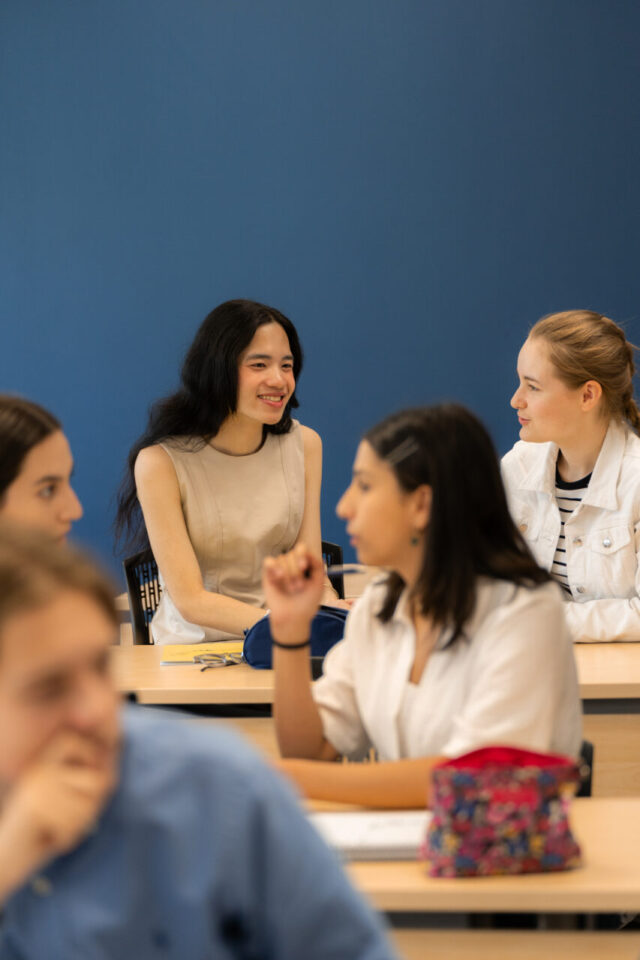
Social Science Graduate Profile
Graduates of the St. Lawrence Social Science Program should be able to
- Explain human realities by using the main facts, concepts, theories, models and approaches specific to the social science disciplines in a multidisciplinary perspective
- Examine and address, in an inclusive manner, various issues related to citizenship in today’s world, to cultural diversity, and to civic engagement
- Use academic work tools and methods as well as the technology, including information technology, needed to successfully pursue their studies
- Demonstrate scientific and intellectual curiosity, and think critically with a concern for ethical issues
- Experiment with social science research methods in accordance with ethical standards
- Convey ideas in a clear and organized manner in English, both orally and in writing, in the context of social science studies
- Read and understand information resources in French in the context of social science studies
- Demonstrate integration of discipline-specific knowledge and methodological skills required for the study of human realities
- Foster life and self-improvement skills and encourage participation in a global, diverse and digital society;
- Learn and work autonomously, by considering one’s learning processes and by designing, planning, carrying out and evaluating projects to meet one’s goals
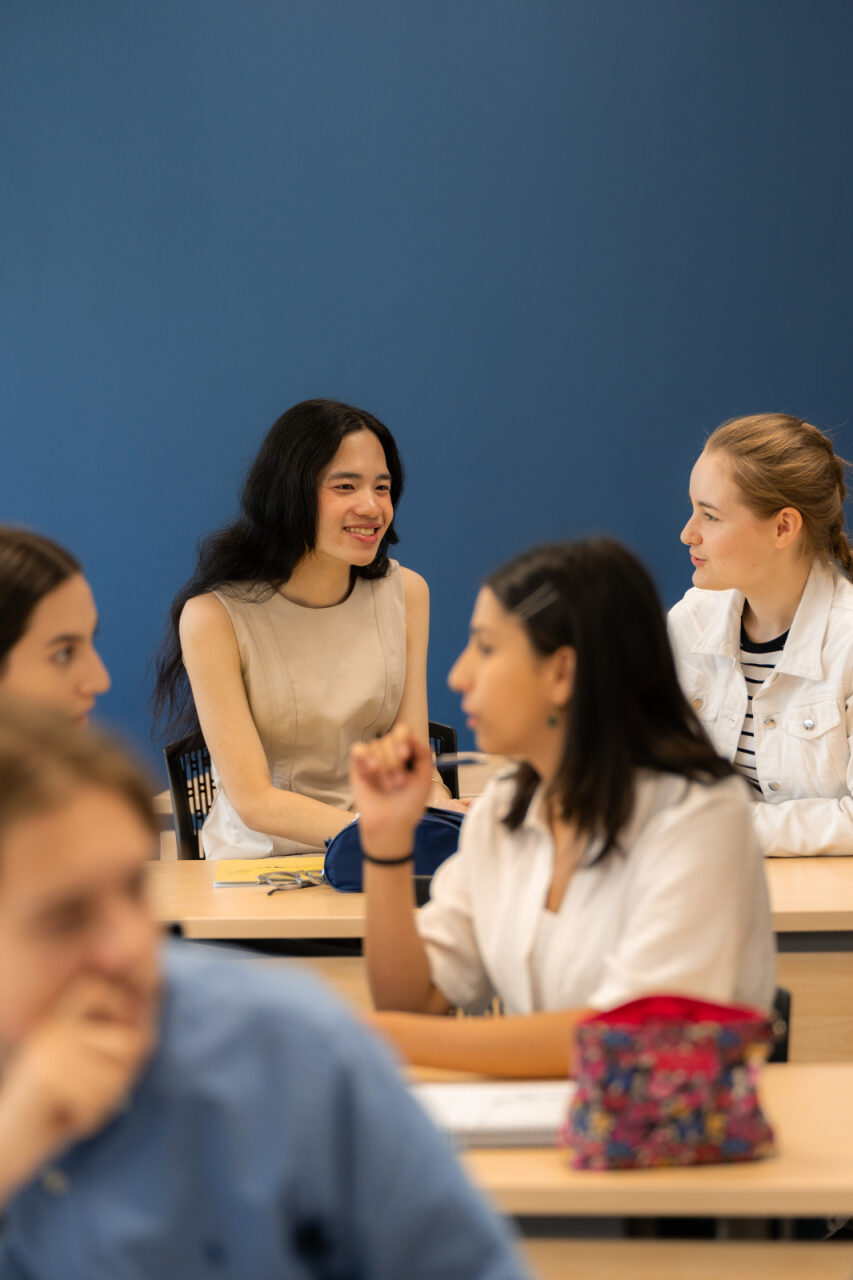

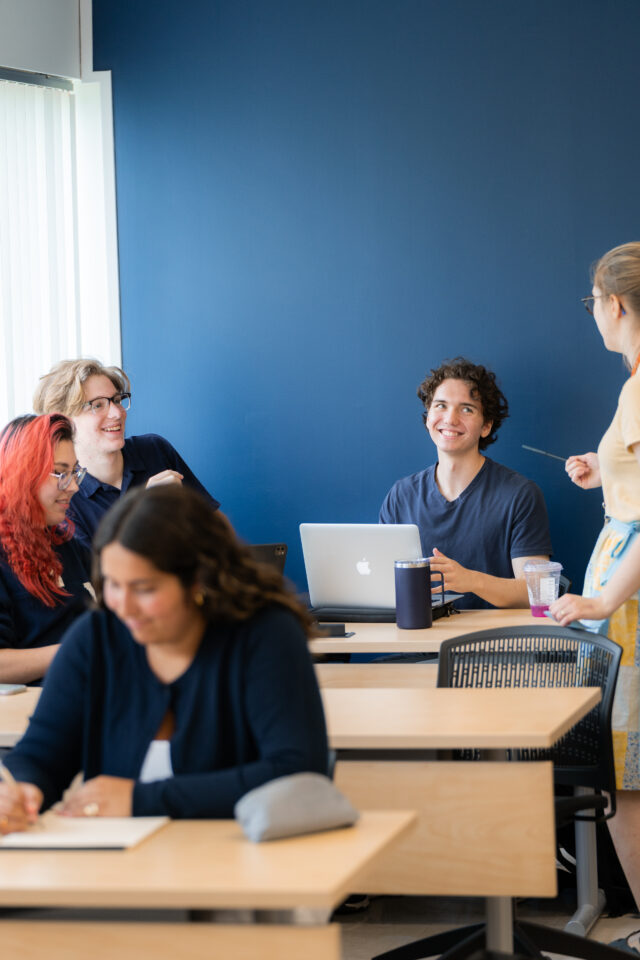
ALC Graduate Profile
Graduates of the St. Lawrence Arts, Literature and Communication Program shall be knowledgeable about the arts, grounded in literature and equipped to communicate in four languages. Graduates shall be able to:
- Approach questions of literary and aesthetic culture with the help of an understanding of Western classics and of English Canadian and Québec cultural contributions;
- Demonstrate intellectual curiosity and rigor in planning and conducting research activities, such as identifying appropriate sources and techniques, reading critically and presenting the results of critical reflection in oral and written form;
- Give expression to the creative process;
- Function with native-level proficiency in English, a high level of proficiency in French and a degree of independence in Spanish and German, supported by an understanding of grammatical structure and phonetics;
- Use appropriate information technology;
- Assess decisions with consideration for one’s own health and well being and for the effect on others and the environment.
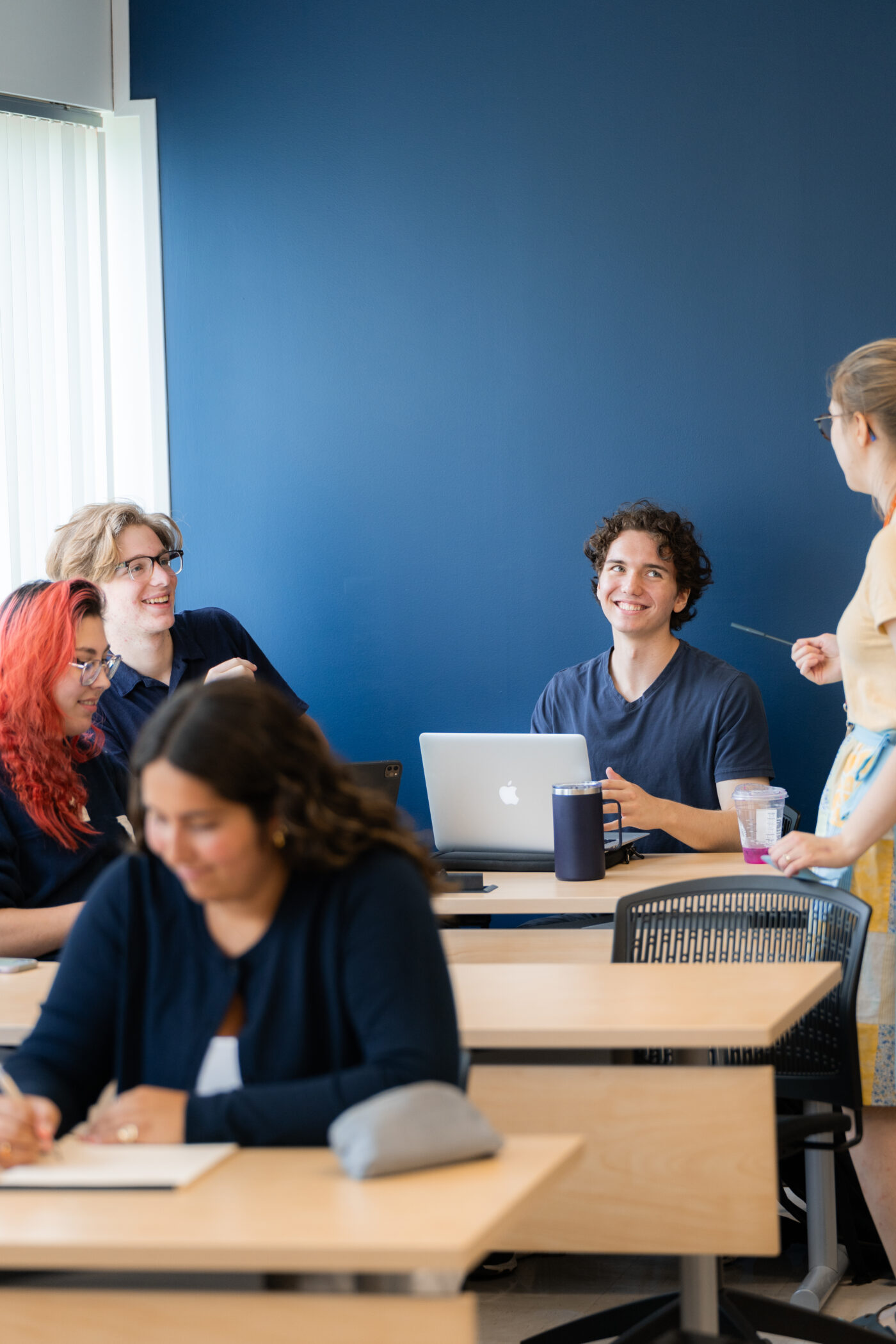

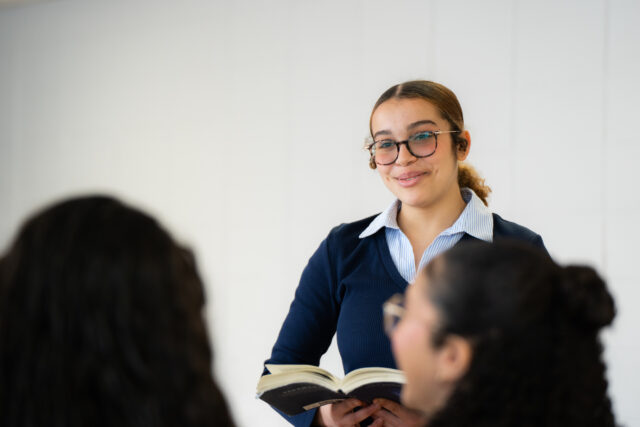
Social Science Comprehensive Assessment
What will be assessed?
The comprehensive assessment will be completed in the IA course that you take in your last semester. See the IA course description in any of the profiles of the Social Science Program.
You must demonstrate your individual ability to integrate the knowledge, skills and attitudes developed throughout your program by preparing, writing and presenting, both orally and in writing, a social science research essay that uses scholarly sources in French and in English, that considers at least three disciplinary perspectives, and that incorporates collection and analysis of primary data. In other words, you are expected to consolidate and demonstrate your achievement of the expectations of the graduate profile.
The subject for the senior research paper will be selected in consultation with the professor. The research paper is to be at least 2,500 words in length. A bibliography of 10 to 15 sources is required with three to five French sources.
How will it be assessed?
The comprehensive assessment will lead to a pass/fail grade based on the attainment of the elements of the graduate profile in the IA course. You must complete all required IA course work in order to pass the comprehensive assessment. Incomplete course work will result in no grade for the final paper, and thus a failing grade for both the IA course and the comprehensive assessment.
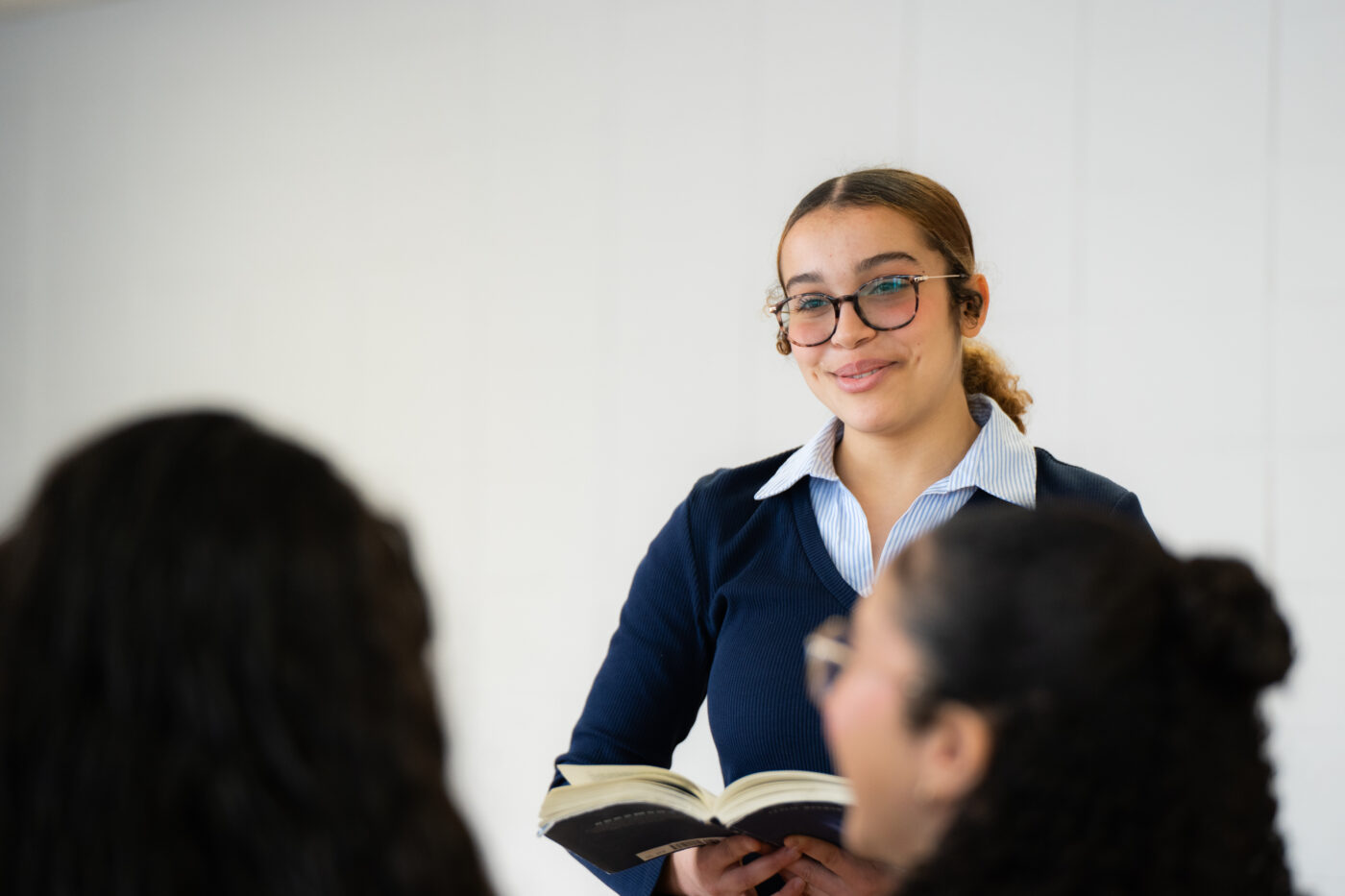

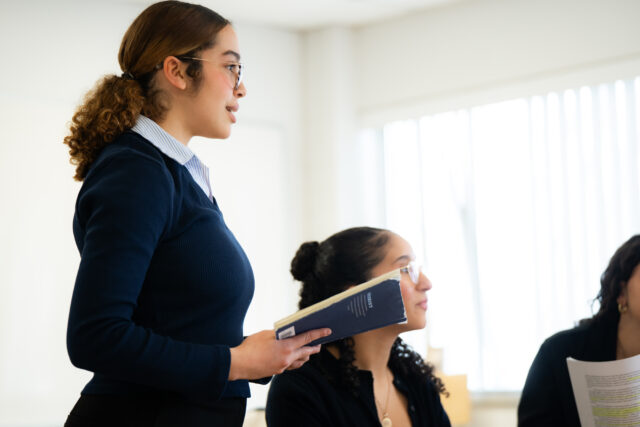
ALC Comprehensive Assessment
A Comprehensive Assessment (C.A.) demonstrating overall attainment of program competencies and the General Education Graduate Profile is required by the College Education Regulations under the General and Vocational Colleges Act and by the College’s Institutional Policy on the Evaluation of Student Achievement (IPESA).
The Comprehensive Assessment for the ALC Program is linked to three courses that involve analytical and creative work in the various languages of the program: Pop Fiction, Projet créatif, and Exploring Cultural Diversity. The Comprehensive Assessment consists of specific oral-based assessments and evaluations along with an essay and a reflection piece in these courses.
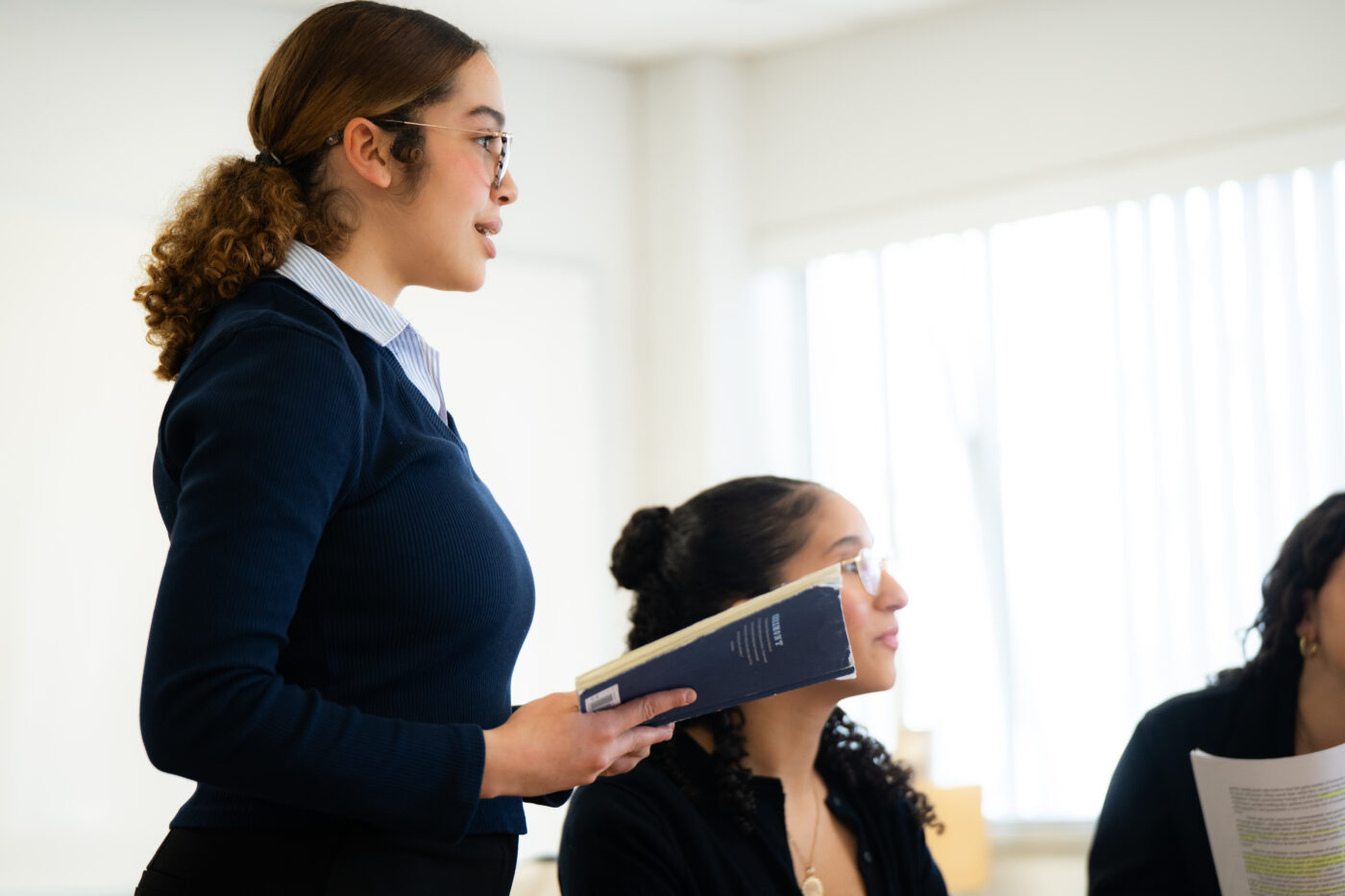

Where Might Your Double DEC Lead You?
A Double DEC prepares you for university programs in both disciplines.
The DEC in Social Science opens the door to numerous programs such as business administration, commerce, communications and journalism, counselling, criminology, economics, education, geography, history, industrial design, industrial relations, international business, international relations, law, political science, psychology, social work, sociology, tourism, and urban studies.
The DEC in Arts, Literature and Communication also prepares students for university programs in diverse fields that can lead to further studies in fields such as classical and ancient studies, communication studies, creative writing, English studies, French studies, German studies, Hispanic studies, international relations, journalism and broadcast media, linguistics and languages, literature, professional writing, public relations, teaching at the elementary or secondary levels, teaching English as a Second Language (ESL) and translation.
